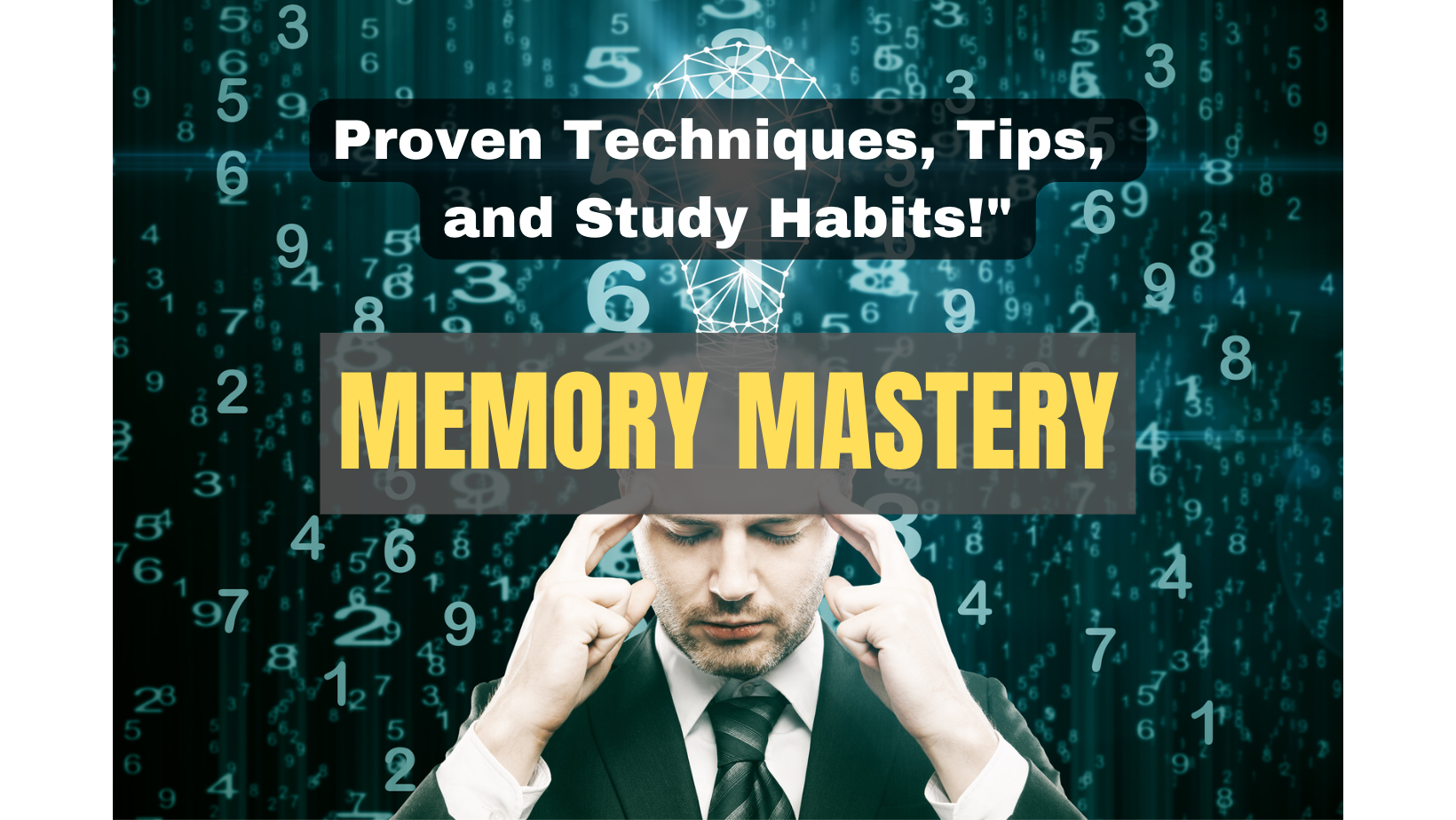Description: Discover the secrets to memory mastery and boost your brainpower to ace your board exams! In this video, we share proven techniques and tips to help you study more effectively, remember information easily, and achieve success in your exams. Unlock your true potential by learning how to optimize your study habits and sharpen your memory. Don’t forget to like, subscribe, and check out our website and Facebook page for more tips and resources! #MemoryMastery #Brainpower #BoardExams
Are you tired of struggling to remember important information for your board exams?
What if we told you that there’s a way to supercharge your memory and make studying a breeze? In this video, we’re going to show you the top strategies for mastering your memory and unlocking your full brainpower to crush your board exams.
Stick around till the end for bonus tips that will give you an edge over your peers.
In this video, we’ll cover:
- The science behind memory
- Techniques to improve memory and retention
- The best study habits to optimize learning
- Bonus tips to make your study sessions more effective
Understanding how your brain forms and stores memories is crucial for developing effective memory mastery techniques. Your brain has three main memory systems: sensory, short-term, and long-term memory. Sensory memory stores information from your senses for a very brief period. Short-term memory, also known as working memory, holds information for about 20-30 seconds. Long-term memory is where information is stored for extended periods, even a lifetime.
Example: When you see a flashcard with an image and its corresponding word, the sensory memory captures the visual information, which then moves into your short-term memory. By using effective memory techniques, you can transfer this information to your long-term memory for easy recall during exams.
Ready for the real game-changers? In the next section, we’re going to dive into the techniques that can turn you into a memory master, making information stick in your long-term memory and helping you ace your board exams. Keep watching!
Techniques to Improve Memory and Retention
1. Mnemonics: These are memory aids that help you remember information by associating it with something more familiar or easy to recall. Acronyms, rhymes, and acrostics are popular mnemonic devices.
Example: To remember the colors of the rainbow, you can use the acronym “ROYGBIV” (Red, Orange, Yellow, Green, Blue, Indigo, Violet).
2. Spaced Repetition: This technique involves revisiting information at increasing intervals to reinforce memory. By spacing out your study sessions, you give your brain the opportunity to consolidate the information in your long-term memory.
Tip: Start by reviewing new information after 24 hours, then every 3 days, and gradually increase the intervals until you reach a comfortable pace.
3. Mind Mapping: This visual technique helps you organize information in a hierarchical structure. By connecting related concepts with lines and branches, you create a map that aids memory and understanding.
Step-by-Step: Start with a central topic, then add subtopics branching out from it. Add relevant keywords or images to the branches, and use colors to differentiate categories.
The Best Study Habits to Optimize Learning
1. Set Specific Goals: Before starting your study session, set clear, achievable goals. This will help you focus your efforts and track your progress.
Tip: Instead of “study biology,” set a goal like “review chapter 3 of the biology textbook and answer the practice questions.”
2. Break Information into Chunks: Breaking complex information into smaller, manageable pieces makes it easier to process and remember.
Example: If you need to learn a long list of terms, group them by category or theme, and study each group separately.
3. Use Active Learning Techniques: Engage with the material actively by asking questions, discussing with peers, or teaching someone else. Active learning promotes better understanding and retention.
Tip: Summarize what you’ve learned in your own words, or try explaining the concept to a friend or family member.
4. Stay Organized: Keep your study materials and notes organized in a way that makes it easy to review and find information when needed.
Tip: Use color-coded folders or notebooks for different subjects and create an outline of the topics you need to cover.
5. Minimize Distractions: Find a quiet, clutter-free environment for your study sessions. Limit your exposure to distractions like social media and noisy environments to maintain focus and concentration.
Tip: Use website blockers or apps to limit your access to distracting websites during your study sessions.
6. Take Regular Breaks: Studies show that taking breaks during study sessions can improve focus and retention. Use the Pomodoro Technique, which involves studying for 25 minutes followed by a 5-minute break.
Tip: During breaks, engage in light physical activity or relaxation techniques to recharge and stay focused.
Don’t go anywhere! We’re about to share some bonus tips and tricks that will make your study sessions even more effective, helping you reach the ultimate level of memory mastery.
Bonus Tips to Make Your Study Sessions More Effective
1. Get Enough Sleep: Sleep is essential for memory consolidation. Aim for 7-9 hours of sleep per night to optimize your brain’s ability to retain information.
Tip: Create a consistent sleep schedule and establish a relaxing bedtime routine to improve sleep quality.
2. Maintain a Balanced Diet: A well-balanced diet, rich in fruits, vegetables, whole grains, lean proteins, and healthy fats, can help support optimal brain function.
Example: Incorporate foods like blueberries, nuts, and salmon into your diet, as they are known for their brain-boosting benefits.
3. Stay Hydrated: Dehydration can impair cognitive function and memory. Drink plenty of water throughout the day to keep your brain sharp.
Tip: Carry a water bottle with you and set reminders to drink water at regular intervals.
4. Exercise Regularly: Physical activity can improve memory and cognitive function. Aim for at least 150 minutes of moderate-intensity exercise or 75 minutes of vigorous-intensity exercise per week.
Example: Try incorporating activities like brisk walking, swimming, or yoga into your routine.
5. Manage Stress: High stress levels can negatively impact memory and learning. Practice relaxation techniques like deep breathing, meditation, or yoga to reduce stress and improve focus.
Tip: Set aside time each day for relaxation and self-care to maintain a healthy balance between studying and personal well-being.
6. Test Yourself: Regularly quiz yourself on the material you’ve learned. Self-testing helps reinforce memory and identify areas that need more focus.
Example: Create flashcards or use online quiz platforms to test your knowledge and track your progress.
Congratulations, you’re now equipped with the knowledge and techniques to master your memory and unleash your full brainpower! Use these strategies to optimize your study habits and crush your board exams.
Thank you for watching this video on Memory Mastery: Unleash Your Brainpower to Crush Your Board Exams! If you found these tips helpful, please give this video a thumbs up and subscribe to our channel for more amazing content. Don’t forget to like our Facebook page and visit our website, which you can find in the description below, for even more resources and tips on memory mastery and study techniques. Happy studying, and good luck on your board exams!



